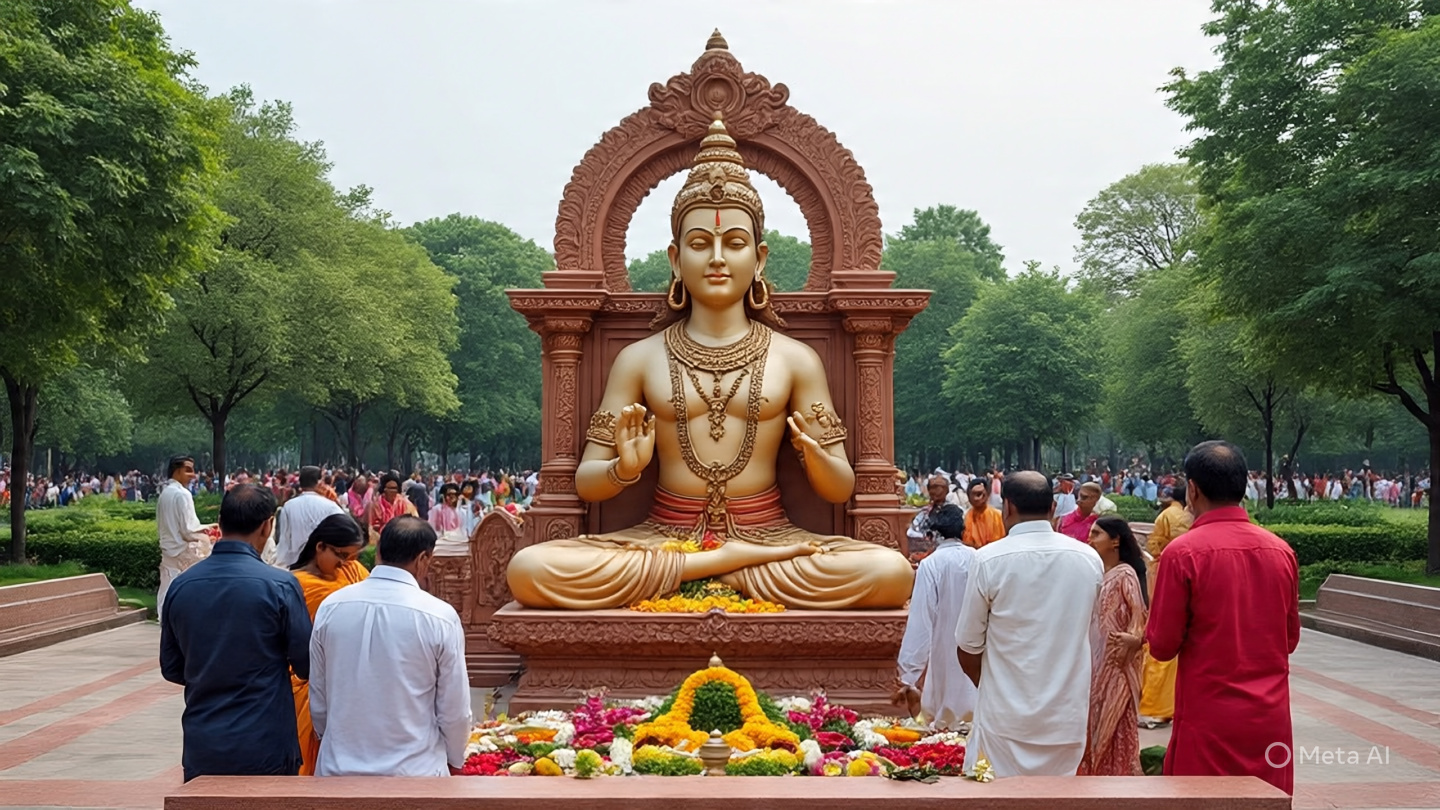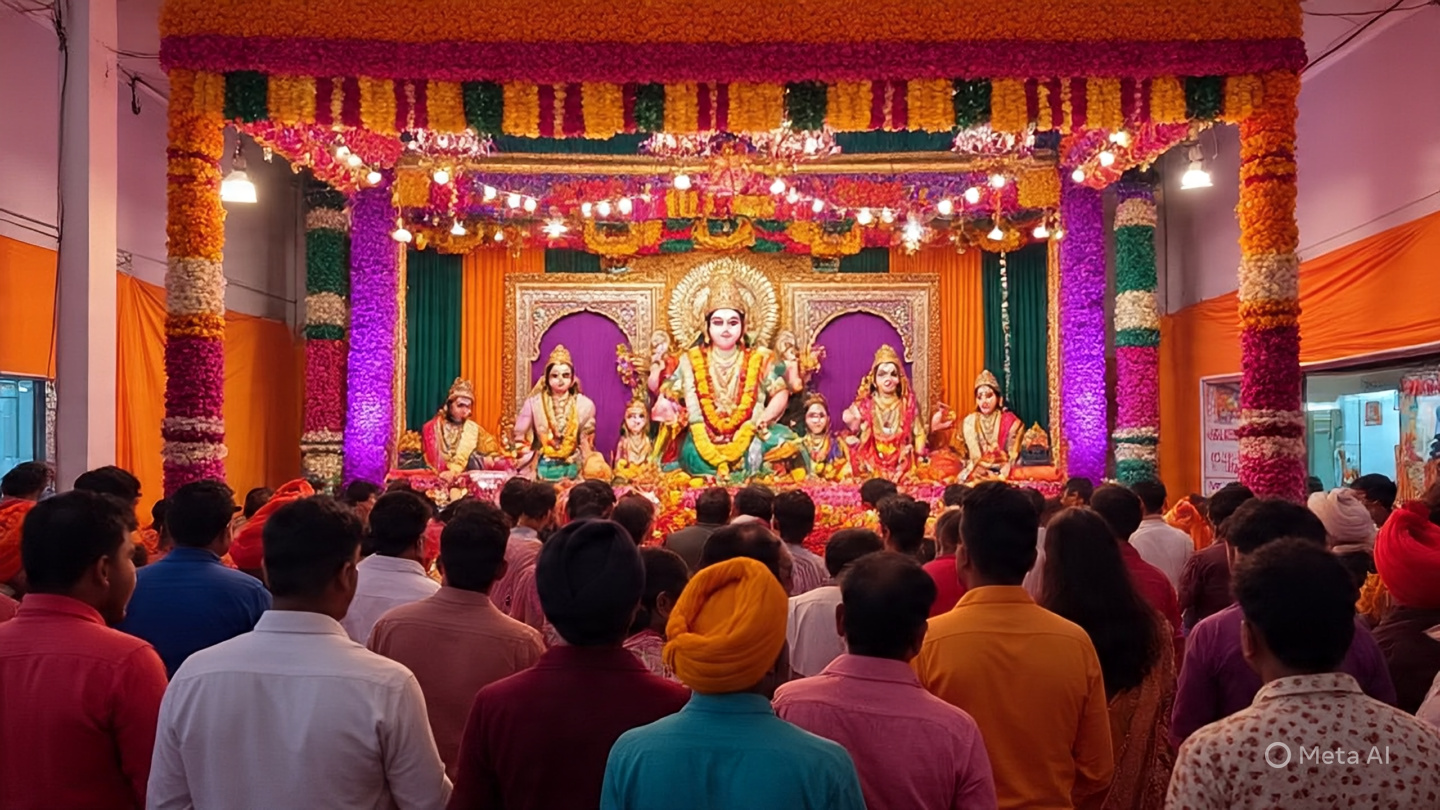Rituals & Worship
- Home /
- Rituals & Worship
Daily Puja Vidhi
🙏 Follow the Traditional Step-by-Step Process for Daily Worship of Mahavira.
Begin with personal cleanliness—bathe, wear fresh clothes, and cleanse the mind with prayer. Many devotees also offer symbolic bathing of the idol (Abhishek) with water, milk, or sandalwood.
Present flowers, rice, sandal paste, incense, and lamps before the idol of Mahavira. These offerings represent purity, humility, and devotion.
Chant Navkar Mantra and sacred Jain sutras. Singing devotional hymns (Stavan) helps cultivate focus, reverence, and inner peace.
Sit in silence, meditate on Mahavira’s teachings of Ahimsa, Satya, and Aparigraha. This step purifies thoughts and aligns the soul with spiritual discipline.
Conclude worship with Aarti (lighting lamps in reverence) and Pradakshina (circumambulation around the idol or shrine), signifying surrender and respect to the enlightened one.
Special Festivals & Mahotsavs
Celebrate the divine occasions marking the significant events in Bhagwan Mahavir’s life

Mahavir Jayanti
Celebrated on the 13th day of Chaitra month (March–April), marking the birth of Lord Mahavira with grand processions, prayers.

Paush Dashmi
Marks the day of his parents’ renunciation and is observed with rituals and prayers linked to Mahavira’s family.
Aarti & Stavan
Sacred hymns and devotional songs to connect with Bhagwan Mahavir’s divine presence
🪔 Aarti (Ceremonial Worship)
Aarti of Mahavir
Traditional evening aarti
ॐ जय महावीर प्रभु, स्वामी जय महावीर प्रभु।
कुण्डलपुर अवतारी, त्रिशलानन्द विभो॥
सिद्धारथ घर जन्मे, वैभव था भारी।
बाल ब्रह्मचारी व्रत, पाल्यो तपधारी॥
Aarti of Mahavir
Traditional evening aarti
ॐ जय महावीर प्रभु, स्वामी जय महावीर प्रभु।
कुण्डलपुर अवतारी, त्रिशलानन्द विभो॥
सिद्धारथ घर जन्मे, वैभव था भारी।
बाल ब्रह्मचारी व्रत, पाल्यो तपधारी॥
🪔 Stavan (Devotional Hymns)
Stavan of Mahavir
Stavans are songs of devotion
- णमो अरिहंताणं: अरिहंतों को नमस्कार।
- णमो सिद्धाणं: सिद्धों को नमस्कार।
- णमो आयरियाणं: आचार्यों को नमस्कार।
- णमो उवज्झायाणं: उपाध्यायों को नमस्कार।
Stavan of Mahavir
Stavans are songs of devotion
- णमो अरिहंताणं: अरिहंतों को नमस्कार।
- णमो सिद्धाणं: सिद्धों को नमस्कार।
- णमो आयरियाणं: आचार्यों को नमस्कार।
- णमो उवज्झायाणं: उपाध्यायों को नमस्कार।
📿 Sacred Mantras & Chanting
Powerful mantras and sacred chants to invoke the blessings of Bhagwan Mahavir
🕉️ Primary Mantras
Namokar Mantra
The most sacred and universal Jain mantra
णमो अरिहंताणं
Namo Arihantanam
Meaning: मैं अरिहंतों को नमस्कार करता हूँ।
Chanting: 108 times daily, preferably during morning prayers
Uvasaggaharam Stotra
A powerful protective mantra dedicated to Mahavira.
उवसग्ग-हरं पासं, पासं वंदामि कम्म-घन मुक्कं।
विषहर-विस्-निन्नासं, मंगल-कल्लन-आवासन।। 1।।
Meaning:मैं उपसर्गों को हरने वाले, कर्मों के बंधन से मुक्त, विष के नाश करने वाले, और मंगलमय कल्याण के धाम भगवान पार्श्वनाथ को वंदना करता/करती हूँ।”
Benefits: Enhances spiritual awareness and removes obstacles
📿 Chanting Guidelines
Proper Chanting Method
1. Namokar Mantra (Navkar Mantra)
The most sacred and universal Jain mantra.
Pays respect to the five supreme beings: Arihants, Siddhas, Acharyas, Upadhyayas, and all Sadhus.
Chanting it purifies the mind and removes karmic obstacles.
2. Uvasaggaharam Stotra
A powerful protective mantra dedicated to Mahavira.
Believed to remove difficulties, obstacles, and negativity from one’s life.
3. Logassa Sutra
A devotional hymn describing virtues of the 24 Tirthankaras, with Mahavira as the last.
Encourages humility, surrender, and spiritual strength.
4. Bhaktamar Stotra
Though dedicated to the first Tirthankara (Rishabhanatha), many devotees chant it alongside Mahavira’s prayers.
Symbolizes faith, healing, and divine grace.
Legends & Spiritual Significance
Powerful mantras and sacred chants to invoke the blessings of Bhagwan Mahavir
Path to Liberation
Monthly Fasting
Observe complete fasting on Ekadashi (11th day of lunar cycle) dedicated to Rishabhdev. This purifies the body and mind while developing self-control.
- Duration: 24 hours
- Frequency: Twice monthly
- Benefits: Spiritual purification
Ayambil Oli
Nine-Day Observance
Observe this sacred fasting period with simple meals and meditation. It purifies the body and mind while developing restraint.
- Duration: 9 days
- Frequency: Twice yearly
- Benefits: Restricted passions
Paryushan Vrat
Eight-Day Festival
The holiest Jain festival focused on forgiveness, meditation, and self-discipline. It strengthens compassion and purifies the soul.
- Duration: 8 days
- Frequency: Annual
- Benefits: Soul purification
